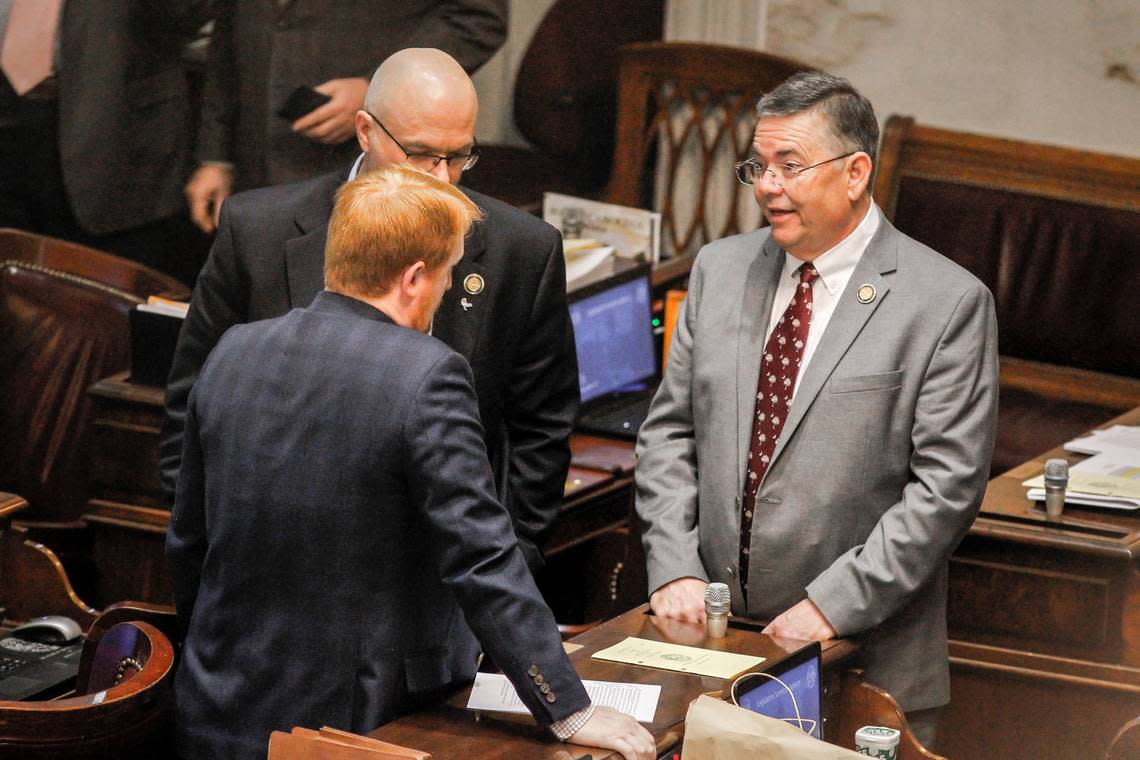Facing time crunch, SC Republicans negotiating 6-week abortion ban. Where it stands

- Oops!Something went wrong.Please try again later.
South Carolina Republican legislators are pushing ahead with a plan to debate a six-week abortion ban in the final days of the legislative session after the Senate last month rejected a bill that would have banned the procedure almost entirely in the state.
The House Judiciary Committee on Tuesday will likely advance Senate-backed legislation, S. 474, that would ban abortions once fetal cardiac activity is detected, typically around six weeks when most people don’t know they’re pregnant, and offer few exceptions for rape, incest, fatal fetal anomaly and to save the mother’s life.
The debate comes less than a year after the U.S. Supreme Court overturned the 1973 landmark abortion case Roe v. Wade and roughly four months after the S.C. Supreme Court ruled the state’s previous six-week ban unconstitutional.
House Majority Leader Davey Hiott told The State that any floor debate would occur Thursday, the final day of the legislative session, which ends at 5 p.m.
If time runs out, Hiott said the debate could be kicked to 2024.
The bill also could be debated this year. With no sine die agreement — a legislative outline that dictates what lawmakers can debate after session — on the table, the governor can call the Legislature back at any point, and lawmakers can work without limitations on what they can debate.
“If we can’t do anything with it this year, it will be teed up for January,” Hiott, R-Pickens, said.
Leaders in both the House and Senate have been negotiating for days over an abortion ban, after Senate Republican leaders had made it clear for months that the upper chamber lacked the votes necessary to pass a near-total ban. Currently, leaders in both chambers are quibbling over possible House amendments that would force the bill back to the Senate.
“We’re trying to figure out if there’s a middle ground somewhere,” Hiott said.
Gov. Henry McMaster has said the exceptions included in the state’s previous six-week law, now blocked, are reasonable.
“I would urge members to present a bill that a majority of the people in the state think is reasonable and is the right thing to do,” McMaster told reporters last month.
State Rep. John McCravy, the driving force behind the House’s near-total abortion ban, had been opposed to a six-week ban, only reluctantly agreeing to exceptions this year to gain approval from the Senate.
McCravy, R-Greenwood, declined to say Friday if he is involved in negotiations, but said he wants to see specific changes to the Senate bill.
Any ban agreed to in the State House and signed by the governor would likely set up a court challenge, a goal of anti-abortion proponents after the state’s high court ruled 3-2 in January that the six-week ban violated the state’s constitutional right to privacy. The make up of the bench has since changed, after the retirement of Justice Kaye Hearn, the only woman on the bench.
She was replaced by Gary Hill, making the court all male.
“The bottom line is that our language will certainly bolster the arguments we heard in our Supreme Court and will certainly give them good reason to uphold the constitutionality of the law,” McCravy said.
McCravy said amendments could include adjustments to ensure it the state Supreme Court finds it constitutional, and guidance to doctors if confronted with a patient deciding to terminate a pregnancy.
“We don’t want there to be any misunderstanding,” with the medical community, McCravy said. “If we thought the Senate would not pass this bill that we get out, we probably wouldn’t bring it out.”
Any changes to the bill will likely face a challenge in the Senate, not just from Democrats.
“I think if they (the House) change one thing in there, as much as a semicolon, that we’re not going to accept it. The women aren’t, and I hope the other people who stood with us won’t accept it too,” said state Sen. Katrina Shealy, R-Lexington, one of five women in the Senate, all who voted against the near-total ban last month.
“I don’t get how a six-year member is telling everybody in the House and in the Senate what to do. I don’t know when we became so weak. He’s not a doctor, he’s an attorney,” Shealy added referring to McCravy, who’s served in the House since 2017.
In response, McCravy said he’s done research over the last year, including having discussions with OB-GYNs, and said others rely on his opinion.
“I’m a representative in the House of Representatives,” McCravy said. “I have the right to propose legislation like anybody else, whether they’re an attorney or not.”
Senior Editor Maayan Schechter contributed to this article.

